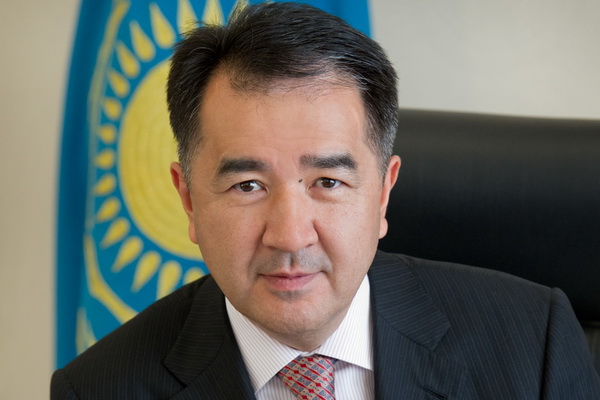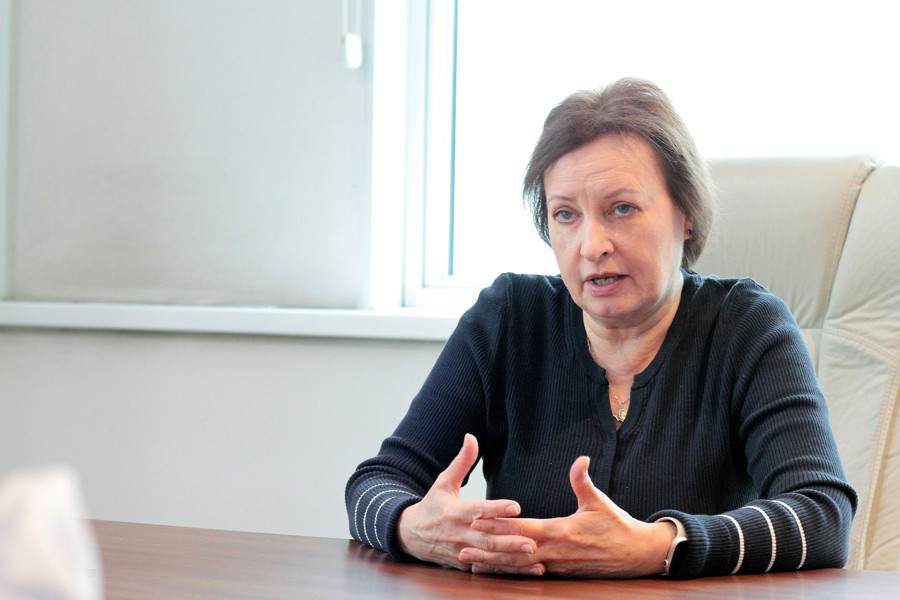First Deputy Prime Minister of Kazakhstan Bakytzhan SAGINTAYEV:
EURASIAN ECONOMIC UNION IS AN INTERNATIONAL ORGANIZATION FOR REGIONAL ECONOMIC INTEGRATION ONLY

Kazakhstan, Russia and Belarus are to sign the Treaty on the Creation of the Eurasian Economic Union (EEU) in a few days. First Deputy Prime Minister of Kazakhstan Bakytzhan SAGINTAYEV told Interfax-Kazakhstan in an interview about the main provisions of the Treaty and directions of the Eurasian integration process.
- Will you please update us on the preparation of the draft Treaty? How does the document define the Eurasian Economic Union?
- The preparation of the draft Treaty on the Eurasian Economic Union is nearing its completion. The document is expected to be signed on May 29, 2014 in Astana.
Article 1 of the Treaty defines the Union as "international organization for regional economic integration."
I would like to emphasize that during the negotiations our standpoint has always been that this integration process ought to be non-political and that any matters adversely affecting the national sovereignty and jurisdiction ought to be left out of discussion.
Initially, Russia and Belarus intended to include in the draft Treaty provisions about an inter-parliamentary assembly, a coordinated foreign policy, cooperation in non-economic areas including health, education, science, culture, legal assistance in civil and criminal prosecution, crossing the state borders and combating illegal migration. However, we insisted that all of the above should not be part of the Treaty as all these areas of cooperation are already covered by the existing agreements within CIS and CSTO as well as by the bilateral agreements between Russia, Belarus and Kazakhstan.
The President of Kazakhstan said in his speech at the Supreme Eurasian Economic Council on December 24, 2013 in Moscow, "In the context of the integration process, the political sovereignty ought to remain untouchable, it is an axiom. However, an economic integration will strengthen our statehood." President Nazarbayev sounded even more straightforward when speaking at the Eurasian Media Forum on April 25, 2013. Let me quote the president: "If our participation in any organization happens to be damaging in any way to our independence and our Constitution, we will immediately leave this organization."
- Do you think the situation in Ukraine as well as possible economic sanctions against Russia can somehow impact the Eurasian integration process ? For instance, here in Kazakhstan, the number of people who are against the Union has increased dramatically after the recent developments in Ukraine, especially after what happened with the Crimea.
- Each state participating in the Union will continue carrying out their own foreign policy.
Article 114 entitled the Treaty and its Conformity with Other International Agreements says that any state participating in the Union can conclude international agreements with third countries or join other unions or international organizations.
This is the fundamental principle of our multifaceted foreign policy. President of Kazakhstan Nursultan Nazarbayev once said that "as sovereign states, we actively cooperate with other countries and international organizations, without prejudice to mutual interests. The Union should not prevent us from continuing doing so."
This integration does not mean that we will become dependent on Russia. First, the Eurasian integration is the creation of a union that is purely economic in its nature. Its purpose is to remove barriers to ensure unrestricted movement of goods, services, investment, labor resources, business activities - all this must be without any damage to the political sovereignty.
Theoretically, the politics will be driven by the goodwill of the state heads toward development of the integration-focused relations. Once again, such relations will be based on the principle of economic benefit for each state participating in the Customs Union and Eurasian Economic Union.
Second, the mass media are viewed as sensitive aspect from the standpoint of national security and will NOT be somehow affected by the economic integration or centrally regulated within the Union. This was Kazakhstan's position and our partners agreed with it, so there will be no dependence as far as mass media are concerned.
Third, there are good pre-requisites for integration of high-tech industries, especially the telecommunication sectors, where mergers are expected in great numbers. We all know that information technology is developing very rapidly and we will have to launch joint projects using the international brands.
The agricultural sector also has enormous potential in terms of building food stocks and exporting food products to Europe, the Persian Gulf states, Southeast Asia and China.
The mining industries of Russia and Kazakhstan have great prospects too, because their products can be widely used in the mechanical engineering, and large producers of equipment and machinery could team up to enhance cooperation, boost production and, thus, become more competitive in the global market.
As far as the economic sanctions are concerned, I would like to note that it is still unclear what specific sanctions will be applied. So far, the states, which are going to impose the sanctions, seem to be uncertain about their intentions.
Should the sanctions against Russia be imposed, they will not directly affect our country, for they will be directed at Russia only. Anyway, we are looking into different scenarios now.
- Where will the governing bodies of the Eurasian Economic Union (EEU) be located? How will they operate?
- The Eurasian Economic Commission is currently based in Moscow. The location of the EEU Court will be agreed upon on May 29 during the signing of the Treaty on the Eurasian Economic Union.
The sides have not yet reached agreement on a supranational body for regulation of the EEU financial markets. In accordance with the decision of the EurAsEC Heads of State dated December 9, 2010, this supranational governing body should be based in Kazakhstan.
The Eurasian Economic Commission will have two governing bodies: a Council and a Board. The three member-states will each assign a dedicated deputy prime minister to sit on the Council and a representative on the Board.
Also, each of the three states will send two judges to work at the EEU Court.
According to the Treaty, directors and deputy directors of the departments at the Commission and the EEU Court will be appointed from representatives of the three states on an equal-representation basis (parity). The composition of the other staff will be proportionate to the financing structure of the departments.
- What will be the role of the Court?
- The legal status of the Court, judges and officers is described in an amendment to the Treaty. The location of the Court is still under discussion.
The Court is to make sure that the EEU member-states duly follow the Treaty provisions, decisions of the EEU governing bodies and international agreements.
This Court will not deal with property disputes or economic damage cases. Its competence will be to reveal any violations of the existing international agreements or conflicts between the EEU Treaty provisions and/or decisions of the Commission and the other international agreements.
- Russian First Deputy Prime Minister Igor Shuvalov has said that Russia, Belarus and Kazakhstan are still far from reaching agreement on free trade in oil, gas, petroleum products, pharmaceuticals, medical products, alcohol and tobacco. Do you think that such agreement will be reached only after the Treaty is signed? How will this situation affect the duties on these goods?
- The three states are still negotiating about the restrictions and limitations in the context of the Treaty. However, I would like to note that the EEU member-states will not be able to lift all restrictions and limitations simultaneously. Later, they will agree on a transition period and a schedule for lifting such restrictions and limitations.
As you may know, any hasty decisions can damage the sustainable development of the countries.
Concerning the mentioned goods, Kazakhstan, Belarus and Russia have already agreed to create a common market of oil and gas, where no export and customs duties will be applied, as well as to provide access to the gas transport infrastructure by 2025.
There will be a common pharmaceutical market that will start operating in 2016. The agreement on creation of this market should be developed and signed no later than January 1, 2015 . Kazakhstan insists that the pharmaceutical market should operate based on the applicable provisions of the Good Manufacturing Practices (GMP).
- Regulation of the banking sector is another sensitive issue. How will the banking sectors of the EEU member-states operate in the future?
- Kazakhstan, Belarus and Russia have agreed to harmonize their financial laws by 2025. The harmonization process will be described in detail in the Treaty and the Agreement on Regulation of the Financial Markets of the EEU Member-States, which is being developed.
It is expected that the requirements for harmonization of the financial laws will be voluntary in 2015-2020, but will become mandatory after 2020.
Once the national financial laws are harmonized, which will happen in 2025, the member-states will decide on the competence and functions of the supranational body for financial market regulation. However, this supranational body will not perform any supervision functions.
- How much additional investment will the Eurasian Economic Union need?
- Kazakhstan views the Eurasian integration as opportunity to reach new markets and attract more investment, especially in its manufacturing industries.
It is worth noting in this context, that foreign direct investment ( FDI) in the manufacturing industries of Kazakhstan has soared 88% since Kazakhstan joined the Customs Union: to $3.4 billion in 2012 from $1.8 billion in 2009. Total FDI in the Kazakh economy in the mentioned period rose 34% to $28.3 billion from $21.4 billion.
We expect this growth to continue after the Eurasian Economic Union comes into existence.
- Thank you for your time !
May, 2014
© 2026 Interfax-Kazakhstan news agency
Copying and use of these materials without reference to the source is prohibited
Archive





